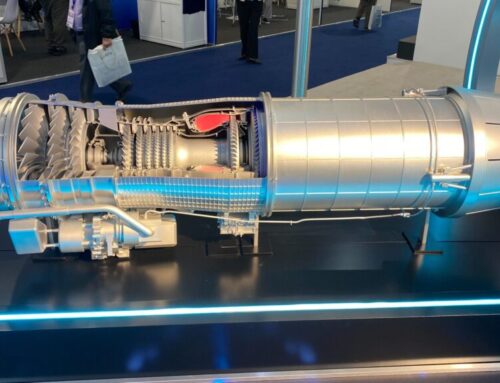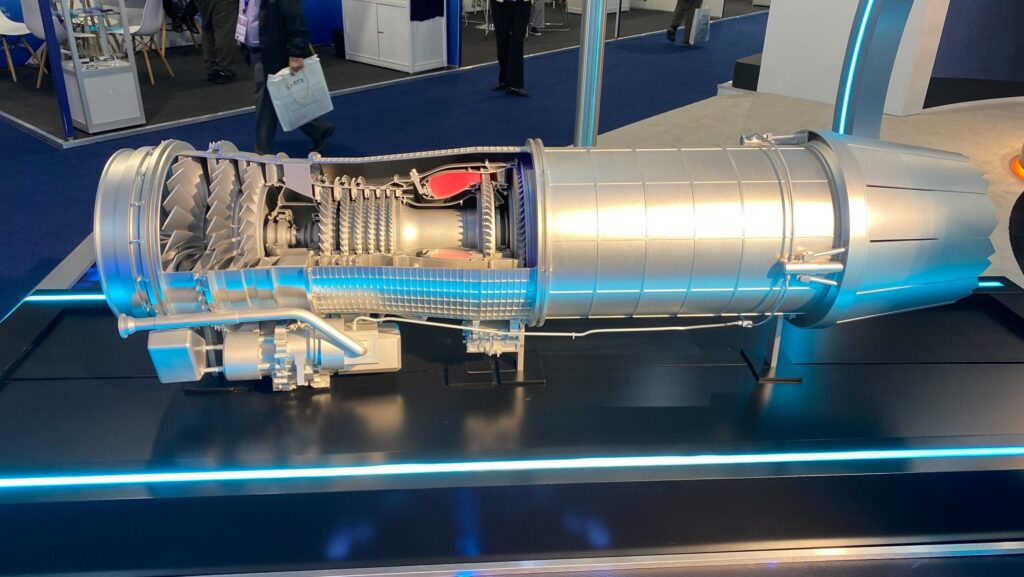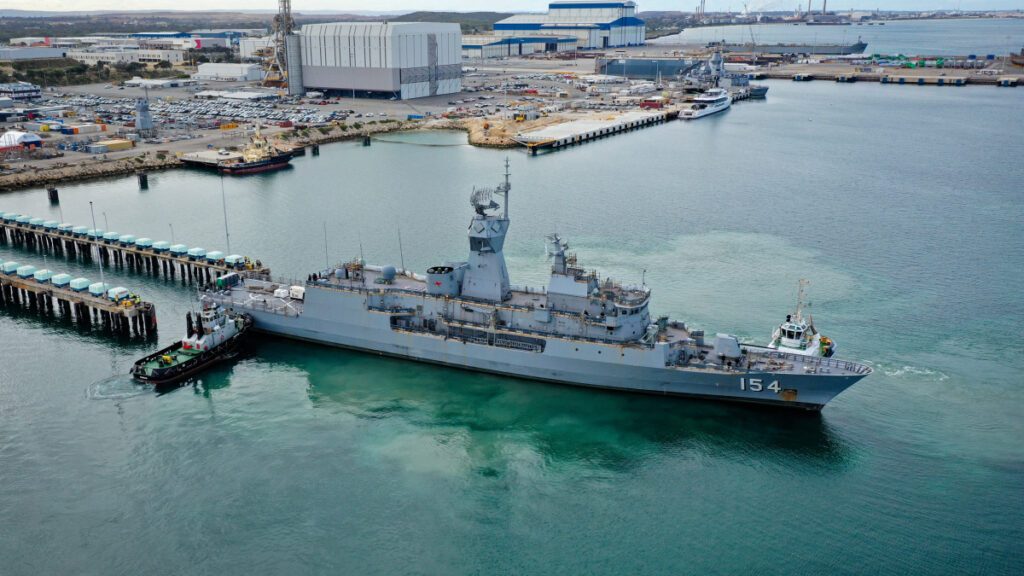The Virginia-class attack submarine Minnesota (SSN 783) is under construction at Huntington Ingalls Newport News Shipbuilding. (U.S. Navy photo courtesy of Newport News Shipbuilding/Released)
SYDNEY — The US State Department this month declined to certify that the United Kingdom and Australia had “comparable” arms control practices, meaning they’re currently not eligible for some key defense trade exemptions. And while government officials painted the decision as little more than a procedural bump in the road for the budding AUKUS trilateral security arrangement, an industry advocate, analysts and some American lawmakers said it may signal less-than-smooth waters ahead for a critical multi-national project.
State’s decision means it will probably be at least another four months before the three countries can begin simpler and faster sharing of sensitive weapon technology.
“I think I would say we expect to finalize the new trade exemptions based on stakeholder input over the next 120 days,” a State Department official told reporters today, adding that it’s possible the certification could come sooner.
The official announced that the department on Wednesday will publicly publish a proposed trade exemption rule for a 30-day public comment period — one to be mirrored by the governments of the UK and Australia the same day.
The most recent deadline for State Department exemption certification lapsed on April 19. At the time both the State Department and the UK Ministry of Defence hailed good “progress” on the tech sharing agenda, but State said it wanted more time to consult industry before proceeding. (The Australian Department of Defence and Foreign Ministry did not respond to a request for comment.)
However, as any longtime observer of arms export law and policy knows, nothing is certain until after it’s happened.
The tenor of reaction in Australia and in the United States was best described as worried optimism about the effects the delay would have on the two-track plan for Australia to buy at least three American nuclear-powered Virginia-class submarines and build a small fleet of SSN AUKUS boats with the help of the US and the UK. The second track of AUKUS, known as Pillar II, revolves around the joint development of advanced capabilities that the nations are pursuing, focusing on areas such as automation and artificial intelligence, quantum computing and hypersonic missile technology.
“I think definitely from the Australian perspective, it really seemed like we had done everything possible that we could do in a really quick timeframe to get that certification,” Amy McDonnell, chief operating officer for the Export Controls Australia Group here, told Breaking Defense in an interview. “So, all of the requirements that were put on to us for having to have a system of export controls comparable to that of the United States — we did that. So we changed our legislation on March 27, the Defense Trade Controls Amendment Act came into force.”
In a post she wrote for the group, McDonnell wrote that “State’s failure […] to certify Australia for its inclusion under the ITAR exemption has stalled progress in defense cooperation efforts. This decision not only affects immediate defense collaboration with follow-on implications for the strategic dynamics of the Indo-Pacific region.”
A top American expert on defense trade, Bill Greenwalt, said some members of Congress who had written the ITAR legislation knew that the certification process at the State Department offered an avenue for skeptics of the ITAR exemption to stall or derail the unprecedented plan to exempt Australia and the UK.
“The legislation had the long-standing poison pill of State certifying comparable systems. So, despite the legislation seemingly doing the right thing, there are those in Congress who knew this would complicate matters and potentially derail AUKUS,” said Greenwalt, who has been closely following the AUKUS plan to create a single group of countries who can share much of their most sensitive military technologies with relatively little hindrance.
Greenwalt, who worked on the Senate Armed Services Committee for decades, said State’s move “could be a negotiating feint to get more concessions out of our allies; a sign that the adults in the room are confronting the ideologues in State and need more time to do so; that the ideologues have won and AUKUS is dead; or (it could be) bureaucratic ineptitude — they truly did run out of time and really do want to consult industry, perhaps through a proposed rule in the Federal Register,” he wrote in an email.
In response to Breaking Defense’s questions about internal pushback, a State Department official deferred to today’s briefing, which did not broach that subject beyond saying that industry consultations in the US, UK and Australia would begin “next week” and that the State Department has worked “incredibly hard” with its British and Australian counterparts on the way forward.
State’s April 19 decision not to certify also drew fire from some key lawmakers. The chairman of the House Foreign Affairs Committee, one of the most important committees in Congress when it comes to arms exports, did not sound pleased.
“This negative certification is very unfortunate, and I am perplexed as to why it was not given to our two closest partners. Because of that, our security efforts will continue to be hindered by International Traffic in Arms Regulation (ITAR),” Rep. Michael McCaul said in a statement. “While I was pleased to see the Commerce Department quickly release an interim rule that will scale back export controls, the State Department continues to delay the necessary decision to deter and counter the threat posed by the Chinese Communist Party in the Indo-Pacific and beyond.”
Similarly, Sen. Jim Risch, the Idaho Republican and ranking member of the Senate Foreign Relations Committee, called the decision “deeply misguided and [one that] further delays the implementation of AUKUS.”
There was a bright ray of hope for the larger effort to allow the three countries to share both dual-use technologies and more restricted weapons system. Australia’s Defense Ministry issued a long release on April 20, praising the United States Department of Commerce announcement the day before, to which McCaul was referring.
“Australia and the United Kingdom are being provided with a national exemption from the Export Administration Regulations. This will reduce the burden associated with US export licenses for dual-use goods to Australia, valued at almost USD $2 billion,” the Australian release said.
What are the stakes, according to the ministry? “A license-free environment between Australia, the United Kingdom and the United States will revolutionize collaboration and enable unprecedented levels of scientific, technological and industrial cooperation and co-development.”
Nick Childs, a naval expert at the International Institute for Strategic Studies, told Breaking Defense that despite officials’ optimism, the 120-day window is a “stressing timeline.”
“[If] the next deadline is missed, that will likely start to set off alarms bells as to whether the parties will be able to maintain the necessary momentum on the Pillar II AUKUS provisions, not least because this is the part of AUKUS that is meant to deliver new capabilities quickly,” Childs said. “The issues at stake remain politically sensitive in all three countries. This all also emphasises the fact that the current state of strategic competition is placing a premium on partners both to be able to share sensitive information and technology more easily among themselves, but also to be able to protect that information and technology more securely from potential adversaries.”
For McDonnell’s part, the experience has already tempered her thinking when it comes to international industrial cooperation.
“So while I do really think that an exemption is going to come for Australia. I absolutely know it’s not going to be a wholesale exemption,” she said.
Asked what she would tell the defense industry, McDonnell said she “would have an optimistic message, but I’ll be saying, you know, recalibrate any expectations. Don’t expect too much. It will have some sort of positive impact in a reduction on your kind of administrative overhead via obtaining licenses, but it’s going to have a lot of carve outs. There’s going to be processes that you have to comply with. It’s not a panacea to everyone’s ITAR complaints, but hopefully it will have some positive impacts.
“So it’s a message of optimism, but just not too much optimism,” she said.






![The sights from the 2024 Farnborough Airshow [PHOTOS]](https://centurionpartnersgroup.com/wp-content/uploads/2024/07/IMG_8722-scaled-e1721930652747-1024x577-hZjwVb-500x383.jpeg)




